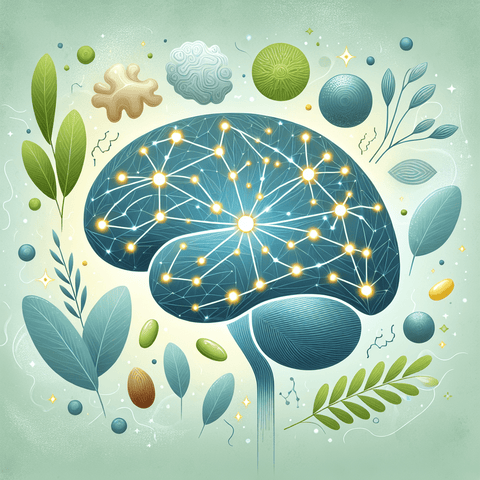Magnesium Brain Functions: The Foundation of Cognitive Wellness
Magnesium is an essential mineral that plays a vital role in maintaining overall physiological balance in the human body, and nowhere is its importance more evident than in the brain. Despite being underappreciated compared to other minerals like iron and calcium, magnesium is crucial to numerous neurological functions and cognitive wellness. Approximately 60% of the body's magnesium is stored in the bones, but a significant amount also resides in the soft tissues, includes the brain. Emerging research is increasingly recognizing magnesium’s role in brain health, emphasizing that optimal levels can enhance memory, reduce anxiety, improve cognitive function, and even assist in the prevention of certain neurodegenerative conditions. At the cellular level, magnesium supports the electrochemical stability of nerve cells. It participates in over 300 enzymatic reactions, many of which are directly involved with neuromuscular transmission and synaptic plasticity — the ability of synapses (the connections between neurons) to strengthen or weaken over time. For example, magnesium helps channel calcium into the cells when needed while blocking excessive calcium that might be neurotoxic if left unchecked. This balance is essential because overstimulation of neurons can lead to excitotoxicity, a condition detrimental to cell survival. Low magnesium levels, often termed magnesium deficiency or hypomagnesemia, can significantly impair brain function. Individuals with insufficient magnesium may experience symptoms such as brain fog, poor concentration, mood swings, and even more serious manifestations like migraines or an increased risk of neurodegenerative diseases. Studies suggest that chronic magnesium deficiency can elevate the risk of depression, anxiety disorders, and cognitive decline, underlining the mineral’s fundamental importance in mental well-being. Modern diets, high in processed foods and low in magnesium-rich whole foods like leafy greens, legumes, nuts, and seeds, have contributed to widespread marginal deficiencies. Coupled with factors such as stress, high caffeine intake, and gastrointestinal conditions, which further deplete magnesium stores, many individuals may unknowingly exist in a suboptimal state regarding this crucial mineral. Therefore, supplementing with high-quality magnesium products can offer a practical route to ensuring that the brain receives adequate support. Explore options such as those found in the Magnesium Supplements Collection on Topvitamine for optimal support tailored to your individual needs.Neurotransmitter Regulation: Balancing Brain Chemistry Naturally
Magnesium is a key player in the synthesis and regulation of neurotransmitters — the chemical messengers responsible for communication between neurons. Neurotransmitters determine everything from mood and cognition to sleep patterns and emotional responses. Magnesium primarily exerts its effects through modulation of excitatory and inhibitory neurotransmitters such as serotonin, gamma-aminobutyric acid (GABA), and glutamate — each playing a unique, vital role in brain chemistry. One of magnesium’s most recognized functions is enhancing serotonin regulation. Serotonin, often referred to as the “feel-good” neurotransmitter, is closely linked with mood, anxiety levels, and sleep cycles. It is synthesized from the amino acid tryptophan through a magnesium-dependent enzymatic pathway. Adequate magnesium levels help facilitate this synthesis and ensure that serotonin signaling remains efficient. In individuals with magnesium deficiency, serotonin production may be suboptimal, potentially contributing to symptoms of depression, irritability, and mood instability. Furthermore, magnesium serves as a cofactor for GABA function. GABA is the brain’s primary inhibitory neurotransmitter, promoting relaxation, reducing neuronal excitability, and contributing to restful sleep. When magnesium levels are sufficient, the binding of GABA to its receptors is facilitated, helping calm the nervous system. This explains why magnesium supplementation is often associated with a calming effect, reduced anxiety, and improved sleep quality. For individuals suffering from stress-related disorders, magnesium may provide valuable support without the side effects commonly associated with pharmacological interventions. Magnesium also acts as a moderator of glutamate, the brain's primary excitatory neurotransmitter. In excess, glutamate can lead to overstimulation of neurons — a condition implicated in neurodegenerative diseases and psychiatric disorders. Magnesium serves as a natural blocker of NMDA (N-methyl-D-aspartate) receptors, which respond to glutamate, thereby preventing excitotoxicity and maintaining synaptic balance. Notably, this function protects the brain from damage and supports cognitive stability. Evidence from clinical studies supports the use of magnesium to improve neurotransmitter regulation. Supplementation has been associated with improved mood states, reduced symptoms of depression and anxiety, and enhanced emotional resilience. While it’s not a cure-all, correcting a deficiency can remove a significant obstacle to mental wellness. The Topvitamine magnesium product range includes formulations specifically designed to support neurotransmitter balance by ensuring bioavailability and optimal absorption.Cognitive Health Benefits: Enhancing Memory, Learning, and Brain Plasticity
Cognition — the suite of mental processes including learning, memory, problem-solving, and decision-making — depends heavily on magnesium. This mineral enhances cognitive performance via its role in synaptic plasticity, particularly long-term potentiation (LTP), the physiological mechanism underlying memory formation. By regulating ion channels and promoting neuroplastic changes, magnesium ensures that synapses can adapt, strengthen, or weaken in response to experience, making learning and memory processes more efficient. Magnesium presence in the hippocampus — the brain region central to learning and memory — has profound implications for cognitive performance. Research has demonstrated that magnesium enhances both short-term synaptic efficiency and longer-term dorsal hippocampal stability. Animal and human studies show promising outcomes regarding magnesium’s potential to strengthen memory consolidation and retrieval abilities. For example, magnesium L-threonate, a form of magnesium able to cross the blood-brain barrier efficiently, has been particularly highlighted in studies for its pro-cognitive properties, improving memory and learning outcomes in both young adults and the elderly. Age-related cognitive decline, including conditions like Alzheimer’s disease and vascular dementia, appears to correlate with lower magnesium levels. Chronic magnesium deficiency has been associated with increased levels of amyloid beta plaque deposition and neuroinflammation—hallmarks of Alzheimer’s pathology. In this context, an adequate magnesium supply may act as a neuroprotective agent, delaying or reducing the risk factors involved in accelerated brain aging. Moreover, a 2010 study published in the journal “Neuron” suggested that increasing brain magnesium levels improves both learning abilities and working memory across age groups. The findings indicate that focusing on this single nutrient can yield measurable improvements in multiple aspects of cognitive performance. While globally recommended daily allowances (RDAs) for magnesium vary, they often fail to account for the nuanced cognitive benefits associated with optimal—not merely sufficient—magnesium levels. Nutritional interventions, including supplementation through high-quality offerings such as those in the Topvitamine Magnesium Category, may therefore serve as an invaluable adjunct in cognitive wellness strategies, particularly for students, aging individuals, and anyone under chronic mental load.Neural Excitability: Modulating the Brain’s Electrical Activity for Stability
The human brain operates via complex electrical signaling among networks of neurons. This electrical activity underpins thoughts, emotions, motor control, sensory perception, and nearly every element of human experience. Magnesium plays a pivotal role in regulating this electrical traffic, ensuring that neural excitability remains within healthy bounds. In simple terms, magnesium serves as a cellular gatekeeper, regulating the flow of ions such as calcium and sodium across cell membranes and stabilizing the voltage-gradient essential for action potential generation. At the heart of this function lies the NMDA receptor, a subtype of glutamate receptor critical for synaptic plasticity and memory function. Under normal circumstances, magnesium ions block the NMDA receptor channel under resting membrane potential, preventing excessive calcium influx. During neural activation, magnesium is briefly expelled to allow communication between neurons. However, if magnesium levels are too low, this channel may remain excessively open, facilitating calcium overload, oxidative stress, and ultimately, excitotoxicity — the condition where neurons are damaged or killed by overactive receptors. One clear clinical example where magnesium’s role in excitability is evident is in epilepsy. Seizures occur when abnormal electrical activity spreads through the brain. Magnesium’s inhibitory effect on current flow through NMDA receptors suggests a therapeutic potential in preventing seizures and convulsive disorders. Moreover, studies show that individuals with epilepsy often have lower magnesium concentrations compared to healthy controls. Another neurological condition tied to neural excitability is migraine, a common and often debilitating disorder. Research indicates that magnesium deficiency may contribute to migraine pathophysiology by promoting cortical spreading depression (a wave of hyperactivity followed by a phase of inactivity in neurons) and by increasing the excitability of neurons in the cerebral cortex. Clinical trials have demonstrated efficacy in using magnesium, particularly magnesium sulfate or orally bioavailable forms, in reducing the frequency and intensity of migraines. It’s also worth noting that neural excitability must be finely tuned to optimize performance of the central nervous system. Imbalances may not only result in disorders but can also reduce overall efficiency in cognitive tasks. For those interested in ensuring stable and optimal brain electrical function, routine assessment of dietary magnesium intake and supplementation where needed — such as options provided by Topvitamine’s magnesium-focused products — can be a sensitive intervention point.Stress Reduction: Calm Your Mind with Magnesium Support
In the face of psychological stress and physiological challenges, magnesium acts as a natural balancer, supporting the body’s adaptive response mechanisms. Chronic stress activates the hypothalamic-pituitary-adrenal (HPA) axis, leading to the prolonged release of stress hormones like cortisol. While short-term elevations in cortisol can help individuals manage acute challenges, persistent high levels disrupt normal brain function, impairing learning, memory, and mood. Magnesium helps to moderate this response, making its role in stress reduction clinically significant. By acting at several levels within the stress-response system, magnesium helps bring equilibrium to an overstimulated nervous system. Firstly, it dampens HPA axis activity, thereby limiting cortisol release. Secondly, it promotes parasympathetic nervous system activity — the “rest and digest” mode — counteracting the sympathetic “fight or flight” response. This shift facilitates relaxation and recovery, essential for mental balance and brain repair. Scientific literature is increasingly validating the anti-stress and anti-anxiety properties of magnesium. A 2017 meta-analysis published in “Nutrients” reviewed 18 studies and found modest evidence supporting magnesium’s role in anxiety management, particularly among individuals with mild to moderate anxiety and magnesium insufficiency. The anxiolytic effect is likely mediated through its impact on neurotransmitters like GABA and its ability to regulate oxidative stress pathways. Furthermore, magnesium’s involvement in regulating sleep quality adds to its stress-reducing toolkit. Poor sleep and stress often coexist, creating a self-perpetuating cycle. Magnesium supplementation has been shown to improve sleep onset, maintenance, and quality, thereby helping the brain to recover and reset following daily exposure to stressors. From a practical standpoint, incorporating magnesium through diet or supplementation is a straightforward yet effective strategy for enhancing stress resilience. Magnesium-rich foods such as leafy greens, avocados, whole grains, and legumes serve as powerful allies. However, when dietary intake falls short, supplements like those available from the Topvitamine Magnesium Collection can ensure adequate supply to support stress management and mental calm.Mental Clarity: Supporting Focus, Concentration, and Overall Cognitive Sharpness
Mental clarity — the capacity for focused thinking, attention management, decision-making, and the absence of “brain fog” — relies significantly on biochemical and energetic efficiency in the brain. Magnesium is instrumental in supporting this clarity. Acting both at the micro-level of synaptic function and the macro-level of hormonal balance and inflammation control, magnesium enhances mental performance and reduces cognitive fatigue. One of magnesium’s most notable effects on mental sharpness is in the production of adenosine triphosphate (ATP), the cellular energy currency. Enzymes responsible for ATP synthesis depend on magnesium as a cofactor. Brain cells, being highly energy-demanding, require continuous ATP production for neurotransmission, signal propagation, and communication among neural networks. In the absence of adequate magnesium, ATP synthesis slows, and cognitive processes become sluggish, often culminating in mental fog, poor memory recall, and decreased focus. Additionally, when inflammation or oxidative stress increases — common results of poor diet, overexertion, or chronic illness — magnesium helps counteract these effects. It exerts antioxidant-like functions by serving as a stabilizer for mitochondrial integrity, indirectly reducing the generation of reactive oxygen species (ROS). This balancing action results in improved cerebral blood flow, better nutrient delivery, and optimal neurotransmission — all essential components of clear, focused mental activity. Research supports the link between magnesium sufficiency and mental clarity. Clinical outbreaks of “magnesium deficiency-induced fatigue” have been documented in both athletes and professionals under high cognitive demand. Supplementation has been shown to restore energetic markers and enhance performance in mental tasks. To maintain optimal levels of mental clarity and energy, consider a daily routine that includes magnesium-rich nutrition and, if necessary, supplements sourced from trusted providers like Topvitamine’s Magnesium Category. These products offer varying formulations — including magnesium bisglycinate and magnesium citrate — specifically chosen for their high bioavailability and ease of absorption, ensuring their effectiveness in enhancing brain performance and focus.Conclusion: Unlocking the Brain-Boosting Power of Magnesium through Supplements
The science is clear: magnesium plays a foundational and multifaceted role in brain health. From facilitating neurotransmitter function and regulating neural excitability to supporting stress resilience and maintaining mental clarity, magnesium remains indispensable for cognitive wellness. Chronic underconsumption, whether from poor diet, stress, or medical conditions, may contribute to various symptoms such as depression, anxiety, brain fog, and even cognitive decline. The good news is that magnesium is readily available through natural dietary sources and, when additional support is needed, through high-quality supplements. Products from the Topvitamine Magnesium Collection are formulated to support energy production, mental performance, and stress management. By selecting bioavailable forms of magnesium like magnesium glycinate or L-threonate, users can effectively target both foundational health and specific concerns such as neural performance or cognitive decline. Integrating magnesium into your brain-healthy lifestyle is not just about avoiding deficiency — it's about optimizing mental capacity, mood stability, and quality of life. As more studies emphasize magnesium’s role in the central nervous system, it becomes evident that it should be a pivotal component of any cognitive wellness strategy.Q&A Section
Q: How does magnesium influence brain function?A: Magnesium supports neurotransmitter balance, neural excitability, energy production, and acts as a gatekeeper for preventing overstimulation in the brain—all essential for mood stability, memory, and cognition. Q: Can magnesium help with anxiety and stress?
A: Yes, magnesium modulates the HPA axis, enhances GABA function, and reduces cortisol release, all of which contribute to relaxation and lower anxiety levels. Q: Which neurotransmitters are affected by magnesium?
A: Magnesium influences serotonin (mood), GABA (calming effects), and glutamate (excitatory control). Q: What form of magnesium is best for cognitive support?
A: Magnesium L-threonate is often recommended for brain-related benefits due to its superior ability to cross the blood-brain barrier. Q: How can I ensure I’m getting enough magnesium?
A: Through a magnesium-rich diet and supplementation if needed. Visit the Topvitamine magnesium collection for trusted products.



